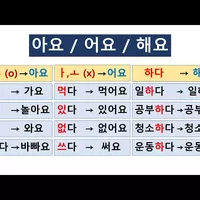Grammar - Informal Polite Style (Sentence Ending)
|informal polite|polite||in|
||Uprzejmy styl nieformalny|||
Grammatik - Informeller höflicher Stil (Satzende)
Grammar - Informal Polite Style (Sentence Ending)
Gramática - Estilo cortés informal (Final de frase)
Grammaire - Style informel et poli (fin de phrase)
Grammatica - Stile informale educato (fine frase)
文法 - 非公式な丁寧語(文末表現)
Grammatica - Informele beleefdheidsstijl (zinnen beëindigen)
Gramática - Estilo informal e educado (Final de frase)
Dilbilgisi - Resmi Olmayan Kibar Üslup (Cümle Sonu)
Граматика - Неофіційний ввічливий стиль (закінчення речень)
语法 - 非正式礼貌风格(句尾)
아요 / 어요 / 해요
I do you do|I do I am|I do
Ayo / uh-yo / do
비격식체 높임말, 존댓말
polite language|honorific language|honorific language
Informal honorifics and honorifics
공이 어디에 있어요?
Where is the ball?
상자 안에 있어요.
box||
It's in a box.
어디에 가요?
Where are we going?
학교에 가요
Go to school
아요 / 어요 / 해요
Ayo / uh-yo / do
어떤 사실을 서술하거나 질문, 명령, 권유함을 나타내는 종결 어미.
certain some|fact|express|question marker|sentence-ending particle|ending marker|indicating|sentence-ending marker|sentence ending marker
|fakt|opisywać lub pytać||tryb rozkazujący|zachęcanie||końcówka zdania|
نهاية نهائية تنص على حقيقة أو تعبر عن سؤال أو أمر أو توصية.
A closing ending that states a fact or indicates a question, command, or invitation.
동사 / 형용사
verb|adjective
Verbs/Adjectives
아요 / 어요 / 해요
비격식체 존댓말
informal speech|polite speech
Informal honorifics
가다
go
기본형
basic form
Default
가 + 아요
Go + No
가요
popular song
먹다
to eat
먹 + 어요
먹 + 어요
먹어요
I eat
Eat
공부하다
to study
공부 + 해요
I study|
Study + Do
공부해요
I study
- 아요
동사/형용사 어간이 'ㅏ,ㅗ'로 끝나면 '-아요'를 붙입니다.
|adjective|stem||'ㅏ ㅗ'|when it ends|-아요|attach
||||na "ㅗ"||"-아요"|dodaje się
If the verb/adjective stem ends in 'a,a', add '-ay'.
작다 / 작+아요 / 작아요
small little|small little||is small
small / small+small / small
놀다 / 놀+아요 / 놀아요
to play|to play|I play|I play
play / play+play / play
가다 / 가+아요 / 가요
to go|||I go
오다 / 오+아요 / 와요
to come|||I come
만나다 / 만나+아요 / 만나요
|to meet||I meet
meet / meet+me / meet
- 어요
- Uh-oh
동사/형용사 어간에 'ㅏ,ㅗ'가 없으면 '-어요'를 붙입니다.
verb||verb stem||'ㅏ ㅗ'|if there is none|-yo|attach
||"temat czasownika"||"ㅗ'가" -> "ㅗ nie"||"-어요"|
If the verb/adjective stem does not have 'a,a,o', add '-어요'.
먹다 / 먹+어요 / 먹어요
|||I eat
eat / eat+eat / eat
입다 / 입+어요 / 입어요
to wear|to wear||I wear
put on / put on+to / put on
서다 / 서+어요 / 서요
to stand|||I stand
stand / stand+you / stand-you
배우다 / 배우+어요 / 배워요
to learn|to learn||I learn
learn / learn+to / learns
마시다 / 마시+어요 / 마셔요
|to drink||I drink
drink / drink+to / drink up
- 해요
- Do it.
동사 어간이 '하다'로 끝나면 '-해요'로 바꿉니다.
||to do||to -haeyo|I change
If the verb stem ends in 'do', change it to '-do'.
일하다 / 일하+여요 / 일해요
|to work|I work|I work
to work / work + come / work
공부하다 / 공부하+여요 / 공부해요
|to study||I study
to study / to study + come / to study
청소하다 / 청소하+여요 / 청소해요
to clean|to clean|I clean|I clean
clean / clean + open / clean up
전화하다 / 전화하+여요 / 전화해요
to call|to call||I call
call / call+open / call me
운동하다 / 운동하+여요 / 운동해요
to exercise|to exercise||I exercise
|Ćwiczyć||
work out / work out + come / work out
'으' 탈락
final consonant|elimination
|Opuszczenie '으'
Eliminate 'ugh'
동사/형용사 어간이 '으'로 끝나면 '으'가 탈락됩니다.
|||with||'으' is|is dropped
|||"으" znika||"으" zanika|zostaje pominięte
If the verb/adjective stem ends in 'ugh', the 'ugh' is dropped.
바쁘다 / 바쁘+아요 / 바빠요
busy|busy||I am busy
|Zajęty||
Busy / Busy+I'm busy / I'm busy
쓰다 / 쓰+어요 / 써요
to write|to write||I write
|Piszę / używam / noszę||
write / write+you / write
끄다 / 끄+어요 / 꺼요
turn off|turn off||I turn off
|Wyłączyć||Wyłączam
Off / Off+Yes / Off
아프다 / 아프+아요 / 아파요
to be sick|sick hurt||I am sick
Boli / Boli mnie|Boli||Boli mnie.
I'm sick / I'm sick + I'm sick / I'm hurting
예쁘다 / 예쁘+어요 / 예뻐요
pretty|pretty||is pretty
|Piękny / Piękna||
pretty / pretty + like / pretty
아요 / 어요 / 해요
||I do
Ayo / uh-yo / do
ㅏ, ㅗ 있어요.
There are a and a.
아요
No
가다 / 가요
|I go
놀다 / 놀아요
|I play
Play / Play
오다 / 와요
|I come
바쁘다 / 바빠요
|I am busy
ㅏ, ㅗ 없어요.
||there isn't
어요
먹다 / 먹어요
|I eat
있다 / 있어요
|there is
없다 / 없어요
|there is not
쓰다 / 써요
|I write
하다 / 해요
|I do
일하다 / 일해요
|I work
공부하다 / 공부해요
|I study
청소하다 / 청소해요
|I clean
Clean / Clean up
운동하다 / 운동해요
|I exercise
같은 뜻, 다른 표현
|||expression
Same meaning, different wording
가장 자주 쓰이는 표현
||used|
Most common expressions
친한 친구나 나이가 어린 사람에게 쓰는 표현
Expressions for close friends or people younger than you
공이 어디에 있습니까?
the ball||is there
공이 어디에 있어요?
|where|is there
Where is the ball?
있다 + 어요
|I am
공이 어디에 있어?
||is there
Where's the ball?
어디에 갑니까?
|are you going
어디에 가요?
|are you going
가다 + 아요
|I go
어디에 가?
연습 문제
보기
먹다 / 먹어요
|I eat
가다 / 가요
|I go
오다 / 와요
|I come
웃다 / 웃어요
to laugh|I smile
Smile / laugh
울다 / 울어요
to cry|I cry
cry / cry
만나다 / 만나요
|I meet
사다 / 사요
to buy|I buy
살다 / 살아요
to live|I live
to live / live
좋다 / 좋아요
|good like
좋아하다 / 좋아해요
|I like
공부하다 / 공부해요
|I study
오늘의 과제
|assignment
날씨가 좋다.
the weather|is nice
The weather is nice.
날씨가 좋아요.
|is nice
날씨가 나쁘다.
|is bad
날씨가 나빠요.
|is bad
The weather is bad.
바람이 시원하다.
the wind|cool refreshing
Wiatr|Wiatr jest rześki.
The breeze is cool.
바람이 시원해요.
|is cool
The breeze is cool.
이 영상이 마음에 드시면 '좋아요'와 '구독'을 눌러 주세요!
시청해 주셔서 감사합니다!

